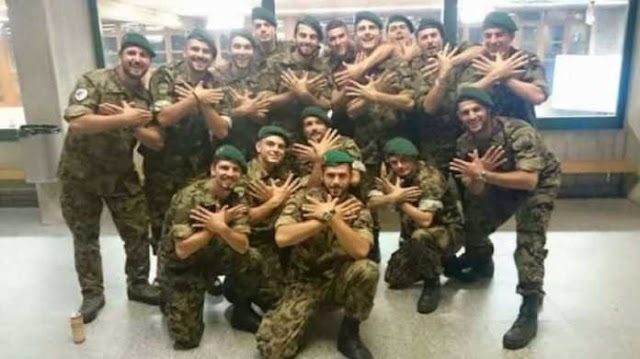 |
| Swiss soldiers of Albanian descent performing the two-headed eagle Albanian symbol |
But the exact number cannot be known because the answer of the military authorities is that Switzerland has only Swiss soldiers and not foreign soldiers.
Elmedin Jashari is an exemplary and distinguished soldier in the Swiss Army. This young Albanian, 20 years old, has shown dedication and responsibility as a member of this army.
"I am very happy and proud to be part of the Swiss Army and I am fulfilling an obligation as a citizen of this country. This proves that we are a positive example by contributing to the Swiss Army,” Elmedin confesses to Albanian media.
There are thousands of Albanians today wearing the Swiss military uniform.
Unofficial figures circulating in Swiss institutes and media say that about 2,000 Albanians today may be an effective part of the country's military.
Swiss Army spokesman Christoph Brunner said in a recent statement, clearly stating that "there are only Swiss soldiers in the Swiss Army." This statement implies the fact that foreigners are considered Swiss nationals and in no way become partitioners.
Among these is Kastriot Asani, an officer in the Swiss Army, who is heading the way of advancement. Also, Jetlira Avdili was a proud Albanian lined up in the Swiss Army, who a year ago occupied the Swiss and international media, for her dedication as a distinguished soldier and her feelings as a Swiss, but without forgetting her background and tradition as Albanian.
Many of the Albanian soldiers in this army are also part of international peacekeeping missions, which carry out important and leading tasks.
They are ready for any military barracks, but the largest and most prominent number is at the Schwyz chüechlibunker barracks in Schwyz, where you can meet dozens of Albanians. It is about the new generation of immigrants, who were born and fully integrated in Switzerland.
The life of a soldier in the barracks
"It is a great pleasure to be a soldier of this country. I once had dilemmas about what it would be like, how I would go about it and what the challenges are. But as the days go I feel very comfortable and having a great time. This is an experience for my life because I have learned so much. I have learned discipline, we are used to living as a family with all other soldiers, showing that we can do nothing without each other. We had very good relations with other officers and military and we respected the hierarchy and schedules of all the duties we had,” says Elmedin.
He says that as in any other army, duties such as training and other duties are performed here as well.
But what gives the Swiss army a special image is the multicultural and multiethnic aspect, as there are many Swiss nationals from different countries from the Balkans, Eastern Europe, Africa, Asia, etc.
"In the unit where I am there are 30 citizens and almost all of us are from other countries. But what matters is that there are no differences, whether you are Albanian, Swiss, White or Black! We are all a group that go well. In the recent period, it is interesting that we have a soldier from every Balkan country and can be described as a small 'mini-Balkan' formation. So it is generally very good to be a soldier in the Swiss Army,” said Elmedin Jashari, who has completed 10 months of full-time military service and is obliged to attend training only on a specific date each year as a reserve soldier.
The obligation to perform full military service in Switzerland is 10 months, for all Swiss citizens between the ages of 18 and 30 years old. Those who perform full service are only obliged to train as reserve soldiers at certain times, or even in the event of a conflict or natural disasters.
There is also the opportunity to complete another 4 months of military service. But for that then you have to go to the army for 3 weeks every year for up to 30 years of age. Those who have any illness and are not obliged to attend the military service are free to leave, but on the other hand, pay their dues every year in the army.
Regarding foreigners / immigrants, they are controlled by many things, in particular their backgrounds, religious activities, etc. Different psychological tests are undertaken during recruitment.
According to a study by the Swiss ETH Institute in Zurich (ETH Zurich), over 25 percent of recruits are with foreign parents. But these statistics nevertheless do not deter the Swiss. According to a survey based on the ETH study, 85 percent of the Swiss accept the multiethnic reality of their army, 71 percent believe that immigrants should be integrated into the military, while only 13 percent believe that foreign-born soldiers are a danger to their safety.
